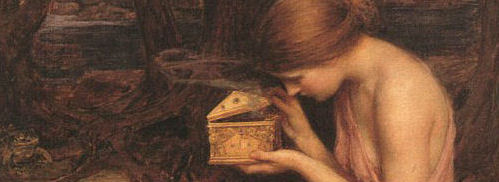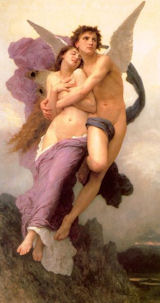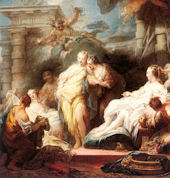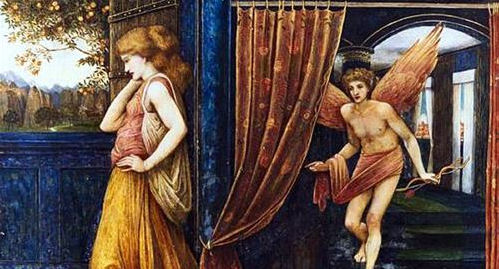




(euphoniousmonks.com, Amor and Psyche:–)
Apuleius's tale begins with Psyche's father deciding to visit the oracle of Apollo in order to beseech the deity to send a husband to wed the maid whom none had wooed:—
... 'Apollo, though an Ionian and a
Greek, in order not to embarrass the author of this
Milesian tale delivered his oracle in Latin as
follows:—'
On some high crag, O king, set
forth the maid,
In all the pomp of funeral robes arrayed.
Hope for no bridegroom born of mortal seed,
But fierce and wild and of the dragon breed.
et cetera, et cetera.
The oracle's mysterious message causes much consternation, on the part of the entire city as well as Psyche's grief-stricken parents.
...
But
the commands of heaven must be obeyed, and the unhappy
Psyche must go to meet her doom, concludes Apuleius
cheerfully.
After delivering a brave speech of acceptance intended to comfort the assembled multitude, Psyche is dressed in bridal finery and left alone on a mountain peak for marriage to the loathsome dragon foretold by Apollo. Whence she is borne by the West Wind to a palace where things unfold in a fashion similar to East of the Sun and West of the Moon though with rather more detail.
You
will perceive, as soon as I have taken you within, that
it is the pleasant and luxurious dwelling of some deity
that I present to your gaze, says Apuleius in the
voluminous description of wonders. Later, as befits
an older audience, rather than the Fairy Tale's terse
narration of the white bear casting off his pelt and
lying beside the girl as a man, the Myth is quite
explicit:—
At length her unknown husband came and
climbed the couch, made Psyche his bride, and
departed in haste before the dawn.
Instead of a warning against being taken alone to another room and questioned by her mother, Psyche is warned against her two sisters, which causes the poor girl to consume the whole day in tears and lamentation, crying that now in truth she was utterly undone; for she was kept a close captive within the walls of her luxurious prison and deprived of all human conversation ...
Should we be surprised that Cupid, like the white bear before him,
... yielded to the prayers of his new-wed bride, and further gave leave to present her sisters with what she would of gold or jewels. But he warned her again and again, with words that struck terror to the soul, never to let her sisters persuade her by their ill counsels to inquire what her husband was like; if she yielded to the impious promptings of curiosity, she would exile herself forever from his embraces and from all the profusion of wealth that now was hers.
And when Psyche's sisters climb to the top of the lonely crag and stand there weeping and calling on their sister by name, she calls on the West Wind, tells him of her husband's command, and at once the sisters are borne down into the valley safe and sound on the wings of his soft breath.
In East of the Sun and West of the Moon, the urgings of the girl's mother are responsible for her undoing. The charming and repellent though persuasive Mr. Wickham performs a similar role in Pride and Prejudice. Lucius Apuleius's Amor and Psyche devises an equally effective literary device:— Psyche's sisters, who manifest a stunning malevolence almost as amusing as, although a good deal more deadly, frank, and honest than that exhibited by Austen's Mr. Wickham:
... 'This done, those good sisters of hers returned home, and the gall of rising envy burned fierce within them, and they began to talk with one another often and loud and angrily. At last one of them spoke as follows:'
Oh! cruel and unkind, unprofitable Fortune! Was this thy will that we, born of the same parents as Psyche, should endure so different a lot? Are we, the elder, who have been given alien king to be their handmaidens and banished from our home and country, to dwell like exiles far from our parents? And is she, the youngest, the last offspring of our mother's weary womb, to be the mistress of such treasure and have a god for husband? ... Whereas I, poor wretch, have got a husband older than my father, balder than a pumpkin, and feebler than any child, and he keeps the whole house under lock and key.
'The other took up the strain:'
I am afflicted by a husband so doubled and bent with rheumatism that he never gives a thought to love ... You may bear your misfortunes with patience, or rather — for I will speak my mind plainly — with servility. As for me, I cannot any longer endure that such wealth and fortune should have fallen to one so unworthy. Remember with what pride and arrogance she dealt with us, with what boastful and extravagant ostentation she revealed her haughty temper! How scanty were the gifts she gave us from the vastness of her store, and how grudgingly she gave! And then, when she was tired of our presence, she had us bundled off and blown away upon a whistling breeze. If I am a woman and have a spark of life in me, I'll oust her from her fortune. And if, as I should suppose, our outrageous treatment rankles in your heart as it does mine, let us both take resolute action ... Those are not truly rich whose wealth is known to no man ... Then, when we have taken earnest thought and formed our plans, let us return in our might to crush her pride.'
'Meanwhile Psyche's unknown husband once more admonished her as he talked with her in the darkness of the night ...'
In fact, under the pressures of marriage and impending fatherhood, Cupid the erstwhile god of wanton love and lustful desire is fast becoming a humourless and colossal bore.
To make this part of an extremely long story somewhat shorter, Psyche's sisters come back in due time, telling her to hone a two-edged knife, and when her husband is sleeping, to raise the lantern, and with all her strength to cut off the serpent's head with the two-edged blade, promising to hasten to her side, to help bear away all her treasure, after which they will find her a human husband. They then take a hasty departure.
As in the Fairy Tale, the curious girl disobeys her husband and attempts to see his face. Overcome with wonder at the beauty of the man sleeping beside her, she leans forward to kiss him — whereupon the treacherous lamp lets fall a drop of burning oil.
... For the god, when he felt the burning smart, leapt from the couch and, seeing his secret thus foully betrayed, tore himself from the kisses and embraces of his unhappy bride and flew away with never a word. But poor Psyche, even as he rose, caught hold of his right leg with both her hands, clung to him as he soared on high, and would not leave him, but followed him for the last time as he swept through the clouds of air, till at last overwearied she fell to earth.
And as in Fairy Tale and Novel, the god and lover reproaches Psyche for believing him to be a wild beast and flies away seemingly forever.
* * * * *
After being dissuaded by Pan the shepherd god from throwing herself from a cliff, Psyche just happens to find herself in the town where the husband of one of her sisters holds sway. She tells the sister that her husband, the son of Venus, Amor himself, was so infuriated by Psyche's betrayal that he intends to take revenge ...
... In atonement for the foul crime you have purposed, be gone from my couch and take with you what is yours. I will marry your sister — and he mentioned your name — with all due ritual. So saying, he bade the West Wind blow me beyond the confines of the house.
Psyche has scarcely finished when her sister, goaded by the stirrings of mad lust and guilty envy, tricks her husband by pretending that she had just received the news of her parents' death, and without more ado took ship and went to that same crag. And there, though it was no wind of the West that blew, yet, aflame with all the greed of blind hope, she cried: Take me, Amor, a wife that is worthy of thee, and thou, wind of the West, bear up thy mistress. So saying, she hurled herself headlong in one mighty leap. But not even in death might she reach that happy place. For her limbs were tossed from rock to rock among the crags and torn asunder, and afterwards ... etcetera, etcetera.
Nor was the doom of Amor's second vengeance long delayed. For Psyche once more is led by her wandering feet to another city, where the other sister dwells. And like the first, she too hastened to the crag and perished by the same death.
Why Amor is to blame for this bloody vengeance, rather than sweet innocent Psyche, is not deemed worthy of explanation by Apuleius — although a modern reader is entitled to suspect that a Roman audience would much prefer that murder and mayhem be dispensed by powerful and immortal gods rather than a frail human female.
* * * * *
It would take a very courageous person to claim knowledge of the true meaning of Fairy Tale or Myth, and yet it can't escape notice that an essential feature of East of the Sun and West of the Moon, as well as Amor and Psyche, lies with the forbidding of the girl to look upon the face of the man who has chosen her as his bride, and the fact that when she disobeys, it leads to a rupture of their relationship.
At the risk of being presumptuous, I believe that the final chapters of Pride and Prejudice deal in part with precisely these essential features, making them common to English Novel as well as Norwegian Fairy Tale and Roman Myth.
________________________